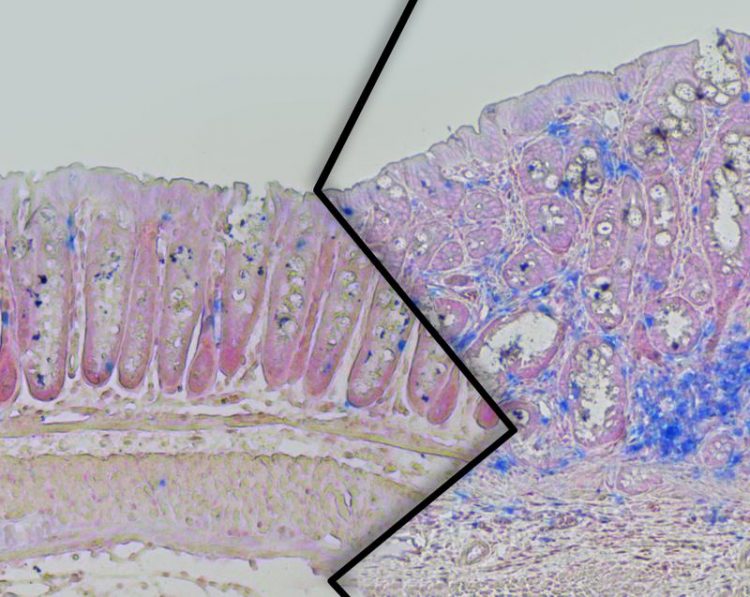Colorectal cancer risk factors decrypted

Colonic tissue from lean (left) and overweight (right) mice of the colon cancer study. In the overweight animals, an enhanced tumor growth with increased numbers of immune cells (blue) can be seen. @ Max Planck Institute for Metabolism Research
According to the World Health Organization’s International Agency for Research on Cancer, colorectal cancer is the third most common cancer type in men and the second most common in women. Eight out of top ten countries in the world with the highest rates of incidence of colorectal cancer are EU countries.
Diet and lifestyle habits, in particular, play a fundamental role, as overweight people are at an increased risk of developing cancer. Scientists from the Max Planck Institute for Metabolism Research in Cologne have now uncovered the links between these two diseases and provide new therapeutic approaches for the prevention of obesity-associated cancers.
“If the body has to store more and more excess fat, it causes a stress response in the adipose tissue,” explains research group leader Dr. Thomas Wunderlich. This stress response alerts the body's immune system, which in turn triggers inflammation in adipose tissue.
Chronic obesity puts the body under constant stress and inflammatory signals spread throughout the body. This ultimately leads to a reprogramming of immune cells, changing their function from cancer-fighting to tumor-promoting.
These new molecular-biological findings were recently published in the scientific journal Nature Communications. First author Claudia Wunderlich, who performed the majority of the studies, said: “Just because you're overweight does not mean you will immediately develop cancer. But when abnormal cells are present in the body, obesity can favour tumor growth.”
Not only does this study provide evidence on how obesity and colorectal cancer are related, but also additional encouraging findings. “Using mouse models, we were able to identify specific targets for possible therapeutic approaches in humans,” explains Claudia Wunderlich.
The researchers already have promising results for reducing the risk of disease in obese mice. To do this, they either eliminated specific immune cell populations, or they genetically altered the animals so that certain immune cells could not be reprogrammed in the presence of a high-fat diet. In both cases, the inflammatory response was attenuated, abnormal cells were targeted for removal and the overall development of colon cancer was reduced.
Dr. Thomas Wunderlich
Max Planck Institute for Metabolism Research, Cologne
+49 221 47260 678
thomas.wunderlich@sf.mpg.de
Claudia M. Wunderlich, P. Justus Ackermann, Anna Lena Ostermann, Petra Adams-Quack, Merly C. Vogt, My-Ly Tran, Alexei Nikolajev, Ari Waisman, Christoph Garbers, Sebastian Theurich, Jan Mauer, Nadine Hövelmeyer, F. Thomas Wunderlich.
Obesity exacerbates colitis-associated cancer via IL-6-regulated macrophage polarisation and CCL-20/CCR-6-mediated lymphocyte recruitment.
Nature Communications, 2018.
Media Contact
All latest news from the category: Life Sciences and Chemistry
Articles and reports from the Life Sciences and chemistry area deal with applied and basic research into modern biology, chemistry and human medicine.
Valuable information can be found on a range of life sciences fields including bacteriology, biochemistry, bionics, bioinformatics, biophysics, biotechnology, genetics, geobotany, human biology, marine biology, microbiology, molecular biology, cellular biology, zoology, bioinorganic chemistry, microchemistry and environmental chemistry.
Newest articles

High-energy-density aqueous battery based on halogen multi-electron transfer
Traditional non-aqueous lithium-ion batteries have a high energy density, but their safety is compromised due to the flammable organic electrolytes they utilize. Aqueous batteries use water as the solvent for…

First-ever combined heart pump and pig kidney transplant
…gives new hope to patient with terminal illness. Surgeons at NYU Langone Health performed the first-ever combined mechanical heart pump and gene-edited pig kidney transplant surgery in a 54-year-old woman…

Biophysics: Testing how well biomarkers work
LMU researchers have developed a method to determine how reliably target proteins can be labeled using super-resolution fluorescence microscopy. Modern microscopy techniques make it possible to examine the inner workings…





















